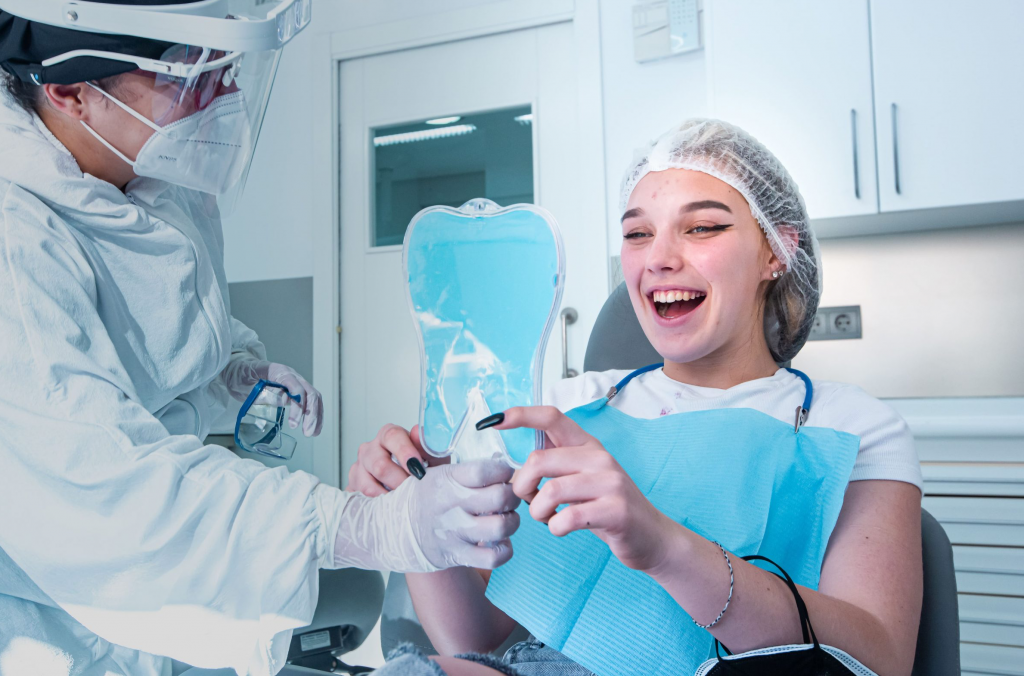Table of contents
What does teeth whitening consist of?
Teeth whitening is a very effective way to lighten the natural colour of teeth without grinding or filing the surface of the teeth.
We are all different, just as the colour of our skin or hair varies, so does the colour of our teeth. Very few people have bright white teeth and it must also be taken into account that our teeth darken as we get older.
This system does not radically change the colour of your teeth, but rather lightens the existing colour.
What causes teeth to darken?
The surface of the teeth is stained by the type of food we eat such as herbal teas, coffee, red wine, curry or saffron.
Smoking is a major cause of tooth staining, as the heat helps to fix stains to the surface of the teeth by drying out the saliva glands, producing a thicker saliva that makes it easier for stains to adhere rather than lubricate the tooth surfaces.
Tartar can also affect tooth colour. Cracks that occur in the tooth enamel due to age or root canal treatment encourage the retention of stains on the tooth surface.
Exceptionally, some people may have stains under the surface of the tooth enamel that have been acquired not superficially but through the bloodstream from taking certain antibiotics.
Can all darkened teeth be lightened with whitening?
Tooth whitening is an effective treatment for natural teeth, so it has no effect on “false” teeth, whether they are removable (removable) or fixed porcelain prostheses (on the roots of natural teeth or on dental implants).
When the stains are superficial, the success rate is higher. Currently, there are also whitening gels that have shown to be effective in the treatment of certain internal stains, although the effect is less than in the case of external stains.
In very aggressive cases of staining caused by tetracyclines, for example, it is advisable to carry out more complex treatments such as aesthetic veneers: replacing the enamel with thin porcelain veneers in the desired colour.
How is tooth whitening performed?

Professional teeth whitening is the most effective way to achieve predictable and fast results.
Firstly, the doctor or hygienist will assess the cause of the staining and the state of the gums, with the idea of predicting the results, as they are not the same with external or internal staining.
Before performing a dental whitening that removes persistent stains, it is essential to carry out a good professional dental cleaning that removes tartar and superficial stains.
A few days later when the gums have recovered and the whitening treatment is carried out. We start by placing a protector on the gum that acts as a barrier so that the whitening gel does not damage it, as it is a liquid prepared to act on hard tissues, not on mucous membranes.
The active ingredient in bleaching is usually hydrogen peroxide or carbamide peroxide. On contact with the tooth, the oxygen penetrates the tooth enamel and lightens it.
To activate the oxygen more effectively, the gel is activated with the use of LED, ultraviolet or laser lamps.
How long does whitening last?
Professional in-office whitening lasts approximately 1 hour. With this treatment, a minimum of 1-2 tones can be whitened if we are treating external staining.
It is generally recommended to continue at home with custom-made trays for 1 hour every day at home with gel syringes provided at the practice. For a further 1 week to 15 days.
How long will my teeth stay white?
The effects of whitening are estimated to last up to 3 years, however this depends on the lifestyle of each person. For example, in the case of smokers or people who drink a lot of coffee, the duration will be shorter.
Our recommendation is to have a reminder at home once a year for a few days to maintain the colour or to repeat the whitening every 2 years.
What are the adverse effects of tooth whitening?
Some people may notice that their teeth become more sensitive to cold after treatment. Others may notice gum discomfort or white spots on the gums.
These side effects usually disappear within a few days. If these discomforts persist, it is advisable to consult your dentist.
Are whitening toothpastes effective?
There are several commercial brands of whitening toothpaste available in pharmacies. Although they do not affect the natural colour of the teeth, they are very effective at removing stains, so although they do not improve the shade of the teeth, they can improve the overall appearance of the smile and are highly recommended to maintain the effect of professional whitening for a longer period of time.
How can I take care of my teeth after whitening?
You can help keep your teeth whiter for longer by reducing the amount of foods and drinks you consume on a regular basis that can stain your teeth. Remember that quitting smoking can prevent discolouration of your teeth.
Here are the general recommendations for those patients who have had it done:
- Brush your teeth 3 times a day (after every meal), the last time just before going to bed with a fluoride toothpaste.
- Reduce your intake of foods and drinks rich in sugars that weaken tooth enamel.
- Visit your dentist regularly for scheduled appointments.
Can children have their teeth whitened?
Staining due to iron supplements is common in young children. These stains are superficial and are lightened by cleaning the surfaces of the teeth with special brushes. In such cases there is no need for professional tooth whitening because the stains are superficial and have not penetrated deep into the enamel.
Can teeth whitening be done on teenagers?
The reluctance of professionals to perform tooth whitening treatments on patients in adolescence is due to the fact that recently erupted teeth have a very wide pulp chamber, very close to the surface of the enamel.
The enamel is a hard but thin layer, while the next layer, the dentine, is very porous and any change in temperature or chemical medium causes a stimulus in the pulp chamber that causes marked discomfort that lasts for days.
That’s why in older people the sensitivity decreases – there must be an advantage to getting older!
Moreover, in adolescents, teeth that have only erupted for a short time and do not have very intense stains, but the change in colour can be reversed in most cases with a dental cleaning and a good brushing 3 times a day for 2 minutes.
If you want more information do not hesitate to call us or come to our Dental Clinic in Marbella.



